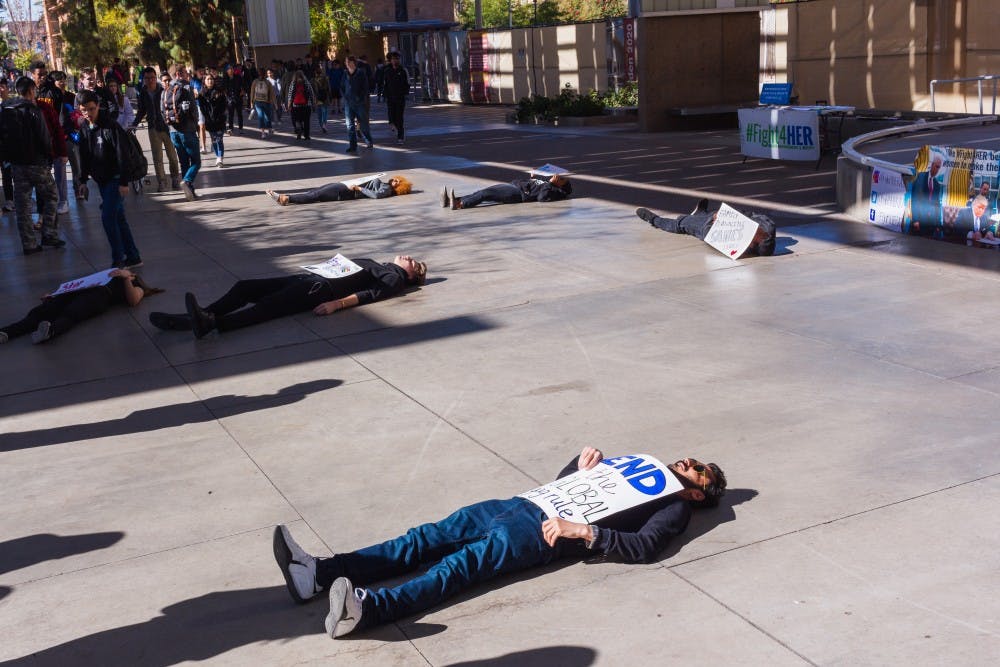A group of student activists participated in a “die-in” protest outside ASU’s Memorial Union on Wednesday to protest the ongoing ban on U.S. funding to international organizations that provide or discuss abortion services know as the global gag rule.
The event was part of the #Fight4HER campaign by Population Connection Action Fund, an activist effort that emerged following the inauguration of President Donald Trump. The group’s mission is to mobilize action against the gag rule and to stir support for the Global Health, Empowerment and Rights Act which would reverse it.
John Kircher, the political director for #Fight4HERAZ and a junior majoring in political science, said that the gag rule “kills millions of women around the world” every year not only by denying them access to abortions, but by taking funding from organizations that even discuss the procedure as an option.
“We’re trying to encourage (the bill) to actually be taken to the House for a vote so we could actually repeal the global gag rule once and for all,” Kircher said.
The gag rule is not unique to the Trump administration — a version of it, known as the Mexico City Policy, was first introduced by former President Ronald Reagan in 1984. Since then, the policy has been enforced during all subsequent Republican administrations and rescinded during all Democratic administrations.
The version issued by the Trump administration on Jan. 23, 2017 earned its name by saying, for the first time, that organizations that even discuss abortion or advocate for abortion law reform will be barred from receiving millions of dollars in family planning funds and U.S. global health aid. The ruling applies to foreign organizations regardless of whether abortion is legal in the country they operate in.
According to a presidential memo, the administration reinstated the global gag rule "to ensure that U.S. taxpayer dollars do not fund organizations or programs that support or participate in the management of a program of coercive abortion or involuntary sterilization."
The rule has already made an impact in other countries — not only on the availability of abortion services, but on the ability of international aid organizations to provide other services, such as prevention and treatment of HIV/AIDS and malaria, as well as support for maternal health.
Protestors said the action negatively affects women who require the services provided by these organizations, representation was meant to call attention to the issue on Wednesday.
“It’s all about health, and it’s about their civil rights,” said Maher Ismail, a junior studying civil engineering and energy and sustainability.
The students who participated in the protest combined signs and chants with what they called a “die-in” demonstration, laying on the ground outside Memorial Union to convey to bystanders on campus the impact of the gag rule.
“Tons of people have died, both women and the children that are born,” Ismail said.
The protest coincides with the two-year anniversary of the Trump administration issuing the gag rule, and occurs almost two years after the Global HER Act was introduced in the Senate on Jan. 24, 2017.
“We have some supporters at the state level, Sen. Kyrsten Sinema is a big supporter of ours and Rep. Ruben Gallego is a big supporter of ours,” Kircher said.
The protest was spirited, with participants chanting “my body, my choice,” “fight for her” and other phrases while encouraging bystanders to sign a petition supporting the bill.
“This is not just our cause,” said Nisea Thurman-Wamubu, a photography major. “This is for your mother, for your grandmothers, your aunts, everybody, every woman that you come into contact with. It matters.”
Reach the reporter at viraviku@asu.edu and follow @vandana_rav on Twitter.
Like The State Press on Facebook and follow @statepress on Twitter.




